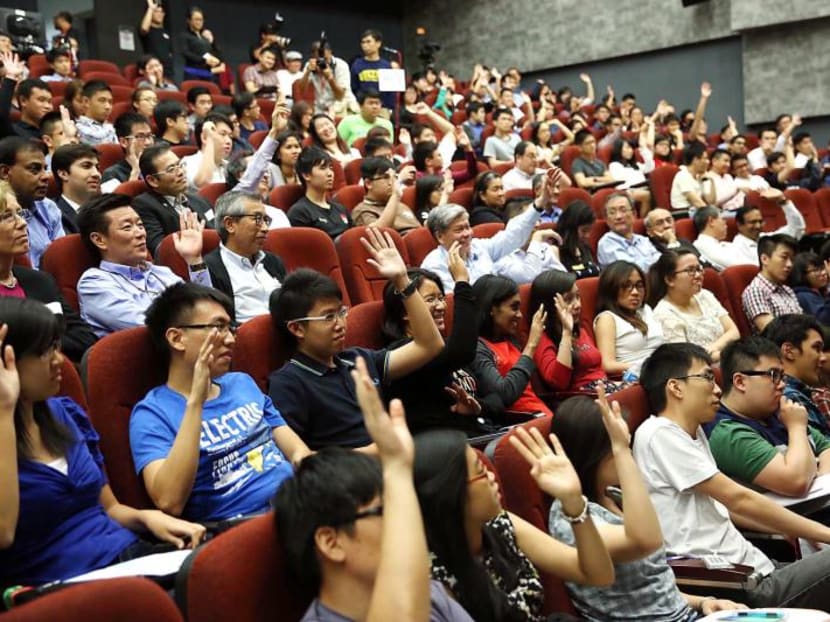S$1b a year to help S’poreans chart lifelong learning journeys
SINGAPORE — Building on the foundation of a first-rate school system, the Government is now seeking to create a new environment of lifelong learning, from enhanced internships and paid apprenticeships for students, to cash credits for skills upgrading for those already in the workforce.
SINGAPORE — Building on the foundation of a first-rate school system, the Government is now seeking to create a new environment of lifelong learning, from enhanced internships and paid apprenticeships for students, to cash credits for skills upgrading for those already in the workforce.
Fresh polytechnic and Institute of Technical Education (ITE) graduates will get a head start in their careers from this year under a new SkillsFuture Earn and Learn Programme.
This will see them matched with employers and assigned mentors as they learn on the job and work towards industry-recognised certification, similar to apprenticeship systems in European countries.
Meanwhile, Singaporeans aged 25 and above will be given an initial S$500 from next year — with no expiry date — to “take charge of their own learning over the course of their lives”, said Finance Minister Tharman Shanmugaratnam, who announced the measures in his Budget statement yesterday.
This SkillsFuture Credit will be topped up at regular intervals and individuals can use it at different stages of their lives as needed.
To cost S$1 billion yearly from now to 2020, these SkillsFuture initiatives are critical moves that will take Singapore’s economy to the next level, said Mr Tharman, who is also Deputy Prime Minister. “More fundamentally, it aims to empower each Singaporean to chart his own journey in life and gain fulfilment at work, even in his senior years,” he said.
The S$1 billion estimate is a significant rise from the S$600 million spent annually on continual education and training in the past five years. The National Productivity Fund for firms to invest in innovation will also receive a S$1.5 billion top-up to partially meet this increase in expenditure, said Mr Tharman.
The SkillsFuture framework will see new modes of learning — from short modular courses to Massive Online Open Courses (MOOCs) — while the Government will enhance existing accreditation frameworks to involve new types of educators and trainers beyond academics.
The Government will also work with stakeholders to develop comprehensive Sectoral Manpower Plans in all key sectors by 2020, which will chart the skills needed by each sector and how to develop them.
Course subsidies for Ministry of Education (MOE) and Singapore Workforce Development Agency courses will be increased to at least 90 per cent, while those aged 40 and above can receive multiple subsidies as they enrol in modules at different times.
To complement these efforts, Singaporeans will be given an online account to chart their learning journey.
Mr Tharman said this “new phase of investment in our people throughout life” has to start from a young age. This does not mean cornering young Singaporeans into a particular career while they are still in school, but helping them discover their strengths and interests, “so they can choose an educational path determined not just by cut-off points, but (also) by informed choices about courses and the career opportunities they lead to”.
The MOE is recruiting career counsellors who will be deployed to schools from July, said a ministry spokesperson. They will guide students through workshops and industry exposure, as well as provide labour market information and market trends, she added.
Polytechnic and ITE students will see “more structured and meaningful” internships with the possibility of overseas placements. This will be rolled out to two-thirds of polytechnic courses and half of ITE courses over the next two years, Mr Tharman said.
The SkillsFuture Earn and Learn Programme will eventually cover one in three polytechnic and ITE graduates. Mr Tharman explained: “They (graduates) start working, they start earning, but they continue studying and graduate from that stretch in work with an industry certification.” Both trainees and employers will receive financial support from the Government.
Said Mr Tharman: “We must make it possible for every individual to decide on his or her own learning journey: When to go for fresh infusions of skills or knowledge and whether it should be in specialised professional training, acquiring soft skills or developing a new interest.
“No one can honestly tell what they will be doing a decade or two after leaving school ... But whichever field we are in or job we do, we must, as Singaporeans, aim to gain expertise and achieve mastery.”
In a statement, the National Trades Union Congress said the moves would help drive productivity and encourage lifelong learning, adding that the SkillsFuture Credit would help workers who do not have access to the Workfare Training Support Scheme.
READ THE FULL BUDGET STATEMENT HERE
Other documents on Budget 2015 available on the Budget 2015 website.







